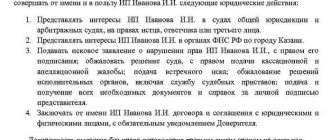Free legal consultation over the Internet 24 hoursLawyer on housing issues in St. Petersburg. Free legal consultation on labor disputes.
5/5 (16)
How to correctly draw up a general power of attorney
A general power of attorney, due to the extensive powers that the principal grants to the authorized person, is a document of serious legal force. According to it, the trustee can perform any legally significant actions on behalf of the principal.
A general power of attorney can be terminated by revoking it. This is usually associated with the actions of the trustee, if the actions are not in the interests of or to the detriment of the trustee. Therefore, the choice of a trustee must be done carefully.
The text of the power of attorney may contain a list of restrictions, that is, those actions that the authorized person cannot perform on behalf of the principal, or special conditions prescribing exactly how the authorized person should act in a given situation.
Such features of the document are provided for in Part 1 of Article 187 of the Civil Code of the Russian Federation. In some cases, delegation of powers is allowed. That is, the principal provides for the opportunity for the authorized person to transfer his powers under a power of attorney to a third party. In this case, the authorized person issues a power of attorney to a third party to represent the interests of the original principal.
As practice shows, granting such powers to a trusted person can give rise to abuse. And this, in turn, inevitably leads to infringement of the rights and legitimate interests of the principal.
Therefore, lawyers recommend not granting extensive rights to a trustee. And use the right of subrogation only in relation to a specific action. For example, buying or selling a car.
Do you need a power of attorney for a child in Russia?
Read how to draw up a power of attorney to receive a salary here.
How to draw up a general power of attorney for the sale of an apartment with the right to receive money, read the link:
Important! A person who has received a general power of attorney in his name has the right, on behalf of the principal, to take actions aimed at:
- alienation of any type of property owned by the principal;
- obtaining loans in the name of the principal secured by his property;
- conducting various transactions with securities of the principal or on his behalf;
- use, possession and disposal of current, deposit and card bank accounts of the principal;
- perform other actions at his own discretion on behalf of the principal and at his expense.
If the principal made a mistake in choosing a proxy and issued a general power of attorney with the most extensive powers in his name, then such a rash step can be costly. Since a general power of attorney is subject to notarization, the notary’s duty is to explain to the principal all the possible consequences of such a step.
The legally correct position of the notary allows you to persuade the principal to issue a power of attorney with narrower powers for the authorized person, specifying all his possible actions. In addition, experienced notaries convince the principal to make a reservation in the power of attorney stating that actions that are not provided for by the terms of the document cannot be performed by the authorized person.
Current legislation provides that only a notary has the right to issue a general power of attorney. True, Article 53 of the Civil Procedure Code of the Russian Federation provides that in some cases such a document can be issued by other officials.
Attention! Our qualified lawyers will assist you free of charge and around the clock on any issues. Find out more here.
A power of attorney is executed only in the presence of the principal. If such a person, due to his physical condition or other reasons, is deprived of the opportunity to come to the notary, then the legislation provides for the possibility of the notary traveling to the location of the principal.
The power of attorney is drawn up in writing. In this case, all requirements that apply to this document must be met. Every notary is well aware of them. For example, the power of attorney should not contain errors, various blots, corrections, strikeouts, or abbreviations. Dates and numbers are indicated in words.
The law obliges a notary, before certifying a general power of attorney, to check the rights and capacity of the principal. This requirement is aimed at protecting the rights and legitimate interests of the person applying for the execution of such a document.
Please note! The power of attorney itself has some features that you should know:
- According to Article 185 of the Civil Code of the Russian Federation, the validity period of the power of attorney may not be indicated. Everything depends on the wishes of the principal;
- the document must have the date of its execution. If the date, month and year of issue of the document are not indicated, then in accordance with paragraph 2 of part 1 of Article 186 of the Civil Code, the power of attorney is considered invalid. This is explained by the fact that from such a document it will not be possible to determine when its validity period ends, since there is no original date;
- The law does not establish the minimum and maximum periods for which a power of attorney can be issued. Everything depends on the will of the principal and the goals he pursues;
- If the validity period of the power of attorney is not specified, then it is considered valid for one year.
A simple power of attorney, which is issued without notarization, must contain the following data:
- the document has a title, which is written at the top of the sheet in the middle - “Power of Attorney”;
- Next, indicate the name of the locality where it was issued, as well as the day, month and year of the document’s creation. In this case, it is recommended to indicate the date of issue of the document in words and not in numbers. If the document does not contain a reference to the name of the locality and the date of issue, then such a power of attorney is considered void, and no action can be taken on it. And those committed will be declared invalid;
- then, on a new line, information about the principal is indicated. His last name, first name, patronymic, individual tax number, national passport details, place of registration;
- the same information is provided in relation to the trustee;
- The following describes the essence of legally significant actions that the principal instructs the authorized person to perform. This can be either one action or a whole list;
- the final part of the power of attorney contains its validity period - a maximum of three years. If the period is not specified, the document is considered issued for one year. Possibility to entrust instructions to another person;
- the power of attorney must contain the signature of the principal indicating his last name, first name and patronymic.
A power of attorney is a document that expresses the will of the principal. Its execution is entrusted to a trusted person. And the fate of the person who issued this document may depend on how he reacts to the fulfillment of the principal’s instructions.
Types of document
The execution of a power of attorney to represent the interests of an individual often depends on its type. A citizen has the right to draw up one agreement and distribute several orders among different people. The form can be filled out in one copy or in several for each authorized individual. Representation agreements are as follows:
- One-time. Such an agreement is issued to perform one action on behalf of an individual.
- Special. Instructions are issued to perform similar actions of the same type.
- General. Issued to fully represent the interests of a citizen.
For car
The most common type of power of attorney is the will of the car owner, by which he authorizes the proxy to perform certain actions in relation to his vehicle.
A power of attorney, in which there are no exceptions to the rights vested in the trustee, means that he has the right to use, own and dispose of the vehicle at his own discretion.
For example:
- sell;
- personally manage;
- exchange for another vehicle or other property;
- to rent;
- deregister with the traffic police, register;
- entrust management to a third party for a period not longer than specified in the general power of attorney;
- travel by car outside the country;
- perform other actions at your own discretion.
How much does a notary cost?
There is no single cost tariff for a general power of attorney from an individual, however, there are a number of parameters that are used by notary offices.
- The price of a power of attorney for relatives will be lower than for other persons.
- An additional fee is charged for each sheet of power of attorney, and the cost depends on filling out information on an area of at least 1/3 of the sheet.
- If there are several attorneys available, the price is indicated for each one separately.
- It is possible to call a notary to your home, but the cost of the service will be higher by an average of 500 rubles.
- For disabled people with category 1 or 2, a discount of 50% is provided.
In Russia, the average cost of a general order is 1.5 thousand rubles.
For real estate
Remember! Current legislation refers to real estate as:
- individual residential building;
- an apartment in a multi-apartment residential building;
- a room in a communal apartment;
- share in any type of housing;
- non-residential premises;
- land plot.
If the owner of real estate issues a general power of attorney to an authorized person to perform actions with his property, then such a person is entitled to:
- re-register a document for real estate from the owner to other persons;
- when making real estate transactions, sign on behalf of the property owner;
- carry out the alienation of real estate by concluding a purchase and sale agreement, donation, exchange;
- carry out any actions with real estate if they do not contradict current legislation.
Cost of notarization of a power of attorney from an individual
Citizens will have to visit a law office to confirm the authenticity of the document. The power of attorney is certified in the presence of the individual whose interests it will represent. The minimum cost of this service in Moscow is 200 rubles. According to the law, the need for notarized confirmation of the authenticity of a document arises if a real estate or financial transaction is planned. The cost of certification of a power of attorney in well-known law firms in Moscow:
| Name of company | Service price in rubles |
| Notary office on Strastnoy Boulevard | 1200 |
| Notary office of Yuldasheva T.V. | 200 – notary fee, 2200 – when performing legal and technical work |
| Notary Baranova Olga Nikolaevna | 1200 for third-party individuals, 800 for relatives |
| Notary Samokhodkina I.I. | 1200 |
| Notary office and translation agency on Okskaya | 1200 |
For all powers
If the principal issues a general power of attorney without limiting the powers of the proxy, then such a document means that the proxy has the same rights as the principal.
That is, an authorized person has the right to act on behalf of the principal, contacting any institutions, organizations or enterprises, regardless of their form of ownership.
In addition, the trustee has the right to enter into contacts with any individuals. The range of questions is unlimited.
Attention! He is also endowed with the right to dispose of all property on behalf of the principal, whatever form it may be in, and whatever it may appear in, that is, the trustee has the right to:
- open current, settlement and deposit accounts in banks;
- close such accounts by withdrawing the funds available on them;
- receive money and postal transfers received in the name of the principal;
- receive his pension, social benefits, wages, various correspondence received in his name;
- respond to all requests on behalf of the principal.
A general power of attorney for all powers allows the trustee to represent the interests of the principal:
- in judicial bodies of various instances;
- in the territorial, republican, regional, General Prosecutor's Office;
- in state authorities and local self-government;
- in ministries, departments, including the Pension Fund, tax inspectorate, civil registration authorities;
- in a housing maintenance office, management company, housing cooperative.
Watch the video. Power of attorney - new rules:
Features of registration for representation in court
A citizen will have to visit a notary or other authorized body that can certify documents. A simple power of attorney to represent the interests of an individual for legal proceedings or appealing a court decision will not work. Its authenticity must be officially confirmed. According to the Civil Procedure Code of the Russian Federation (Civil Procedure Code of the Russian Federation), the document must be certified by one of the following persons:
- the head of the organization where the principal studies or works;
- notary;
- head of prisons;
- chief physician of a medical institution;
- head of the military unit.
The right to represent the interests of the organization
Powers of attorney are issued not only by individuals, but also by organizations, institutions, and enterprises.
A power of attorney issued on behalf of a legal entity gives the right to represent the interests of the legal entity in legal relations with all bodies, institutions, organizations and individuals, as well as to act in its interests and enter into various types of agreements, such as:
- purchase and sale of goods and other inventory items;
- supply of goods that are used for state or municipal needs:
- acquisition of movable and immovable property, complete property sets, enterprises of various forms of ownership;
- exchange of goods or manufactured products for other goods or products necessary for the implementation of statutory activities;
- lease of movable and immovable property;
- financial leasing;
- rental of residential and non-residential premises;
- free use of property;
- construction contract;
- performing design and survey, research, development and technological work;
- provision of services on a paid and free basis;
- transportation of goods and passengers;
- freight forwarding;
- obtaining a loan and bank loan;
- issuing a loan, trade credit;
- financing various projects under the assignment of monetary claims;
- bank deposit, including placing free funds in deposit accounts;
- opening current and card bank accounts;
- storage of inventory items;
- property and employee insurance;
- instructions;
- commissions;
- agent support;
- trust management of movable and immovable property of a legal entity, including transactions with securities;
- concessions on a commercial basis;
- simple partnership;
- guarantees for another legal entity or individual;
- assignments;
- transfer of monetary debt;
- power supply of facilities and structural divisions;
- gas supply for production needs;
- heat supply for administrative and industrial premises;
- water supply and sanitation.
Attention! In addition, the authorized representative has the right to sign and certify with the seal of a legal entity the following agreements:
- on the presentation of a bank guarantee;
- on the transfer of movable and immovable property as collateral;
- deposit;
- voluntary compensation for material and moral damage caused;
- financial assistance on a repayable and non-refundable basis.
A power of attorney gives the trustee the right to sign and certify with a seal such documents as:
- act of acceptance and transfer of work performed or services provided;
- act of acceptance and transfer of movable and immovable property;
- act of acceptance and transfer of promissory notes and bills of exchange, simple and registered shares, government bonds, other securities and documents.
A power of attorney gives the power of attorney the right to participate in:
- at all general meetings of shareholders of a legal entity;
- in general meetings of company participants.
Please note! In this case, the authorized representative has the right:
- votes taking into account all shares owned by the principal, shares in the authorized capital on all issues included in the agenda;
- introduce other issues on behalf of the principal at his own discretion;
- exercise other rights and fulfill the duties of the principal as a shareholder, participant in companies.
A power of attorney issued to an authorized person allows:
- represent the legitimate interests of the principal in arbitration courts, courts of general jurisdiction, and magistrates' courts;
- exercise powers and perform all procedural actions provided for by law that are provided to a party in a lawsuit;
- sign a statement of claim, submit it to the court, submit the dispute to an arbitration court;
- make a counterclaim;
- refuse the stated claims partially or in full;
- reduce the amount of claims;
- change the subject or basis of the claim;
- recognize the claim filed against the principal;
- enter into a settlement agreement at any stage of the legal process;
- file an appeal and cassation complaint against a court decision or ruling;
- appeal the actions or inaction of the bailiff;
- present or revoke a writ of execution;
- receive property or funds awarded to the principal.
Invalidation of the power of attorney
The law provides for conditions when an agreement between the principal and the attorney should be considered annulled. We are talking not only about the official revocation of the document, but also about other circumstances that change the validity period of the guarantee. An agreement to represent the interests of an individual is considered invalid if:
- the principal dies, goes missing, or is declared partially or completely incompetent;
- the agreement has officially expired;
- the order specified in the document was carried out;
- the attorney refused to accept the agreement;
- the person for whom the order was issued died;
- the organization that was listed as the trustee was liquidated.
Documents for drawing up a general power of attorney
In order to notarize a general power of attorney, the principal must submit the following personal documents to the notary office:
- national passport;
- TIN;
- SNILS.
The scope of powers that the principal wishes to entrust to the authorized person obliges him to provide other documents. For example, title documents for movable and immovable property, bank account data, and so on.
Before certifying the signature of the principal, the notary is obliged to explain to him the content of Article 185 of the Civil Code, about which to make a special note.
How to revoke a document
Situations often arise when a citizen wants to cancel a valid order. The possibility of revoking a power of attorney is indicated in a separate paragraph on the form. The procedure for canceling an order depends on the form in which it was drawn up. Regardless of the type, the attorney is required to return the signed form to the principal upon revocation. To revoke a power of attorney drawn up in simple written form, you must:
- Notify the authorized person in writing of the termination of the guarantee. This can be done using modern means of communication (Internet, mobile communications) or by mail. A registered letter is sent to the citizen’s place of residence or temporary stay.
- Notify all organizations with which the guarantor was supposed to interact that the document has been cancelled.
- Meet with an authorized representative to pick up a power of attorney to represent interests.
The steps to cancel a notarized document will be similar. The citizen must contact the specialist who issued the written order and inform him about the revocation. At the request of the client, the notary can independently notify the attorney that the current agreement has been canceled at the request of the principal. Procedure for canceling a notarized power of attorney:
- The principal informs the notary of his desire to cancel the agreement.
- The notary, at the request of an individual, notifies the attorney that the power of attorney has lost its force and asks for its return.
- The attorney returns the document to the notary or principal. According to the law, there is no particular difference in who will keep the revoked power of attorney.
- The principal, if the agreement was transferred to him, comes to the notary, who enters information about the cancellation into the register
If a citizen does not have information about where the attorney is located, then the letter is sent to his last place of residence. The law considers revocation of an agreement not as a right of the principal, but as his obligation. If an individual decides not to inform the guarantor, then all his actions will be equated to the own actions of the citizen whose interests he represents.
Action Restrictions
The execution of a general power of attorney also has some restrictions that are established in the interests of the persons on whose behalf the document is issued.
So:
- on behalf of minors, as well as persons who are recognized as legally incompetent, a power of attorney can only be issued by persons who are their parents or legal guardians;
- persons whose age is from 14 to 18 years are authorized to issue a power of attorney to third parties independently. However, this will require you to provide the notary with written permission from your parents or guardian.
It should be borne in mind that in relation to some types of transactions, the law allows such persons to carry out legal actions without obtaining the consent of guardians and parents.
Approximate contents of a power of attorney for the sale, rental and other actions with the apartment
Now let's look at the approximate structure of a notarized power of attorney and its content.
- At the very top, the name of the document (“Power of Attorney”), the place of its issue and the date are indicated. By the way, the date of issue of the power of attorney is a prerequisite for its validity.
- This is followed by the surname, name and patronymic of the principal, indication of citizenship, date and place of birth, his full passport data, information about the authority that issued the document, and address of residence. This is followed by information about your real estate. For example, the address of the location of the apartment, its area, number and date of issue of the certificate of ownership, the basis for acquiring the right.
- Similar information about the trustee is provided below. It is important to say that one power of attorney may indicate several representatives. In this case, everyone can be granted both an individual scope of rights and all the rights specified in the power of attorney.
- The following is information about the order that you trust to be carried out on your behalf. In our case, this means carrying out any transactions with the specified real estate, including alienation by any method not prohibited by law and rental. To do this, the representative is delegated the authority to submit and receive any documents, including certificates, extracts, statements, explanations, and sign all documents necessary for the proper execution of the specified order. As well as representing your interests in all state and non-state bodies or before individuals on issues related to the assignment.
- The following are indicated: the validity period of the power of attorney, an indication of the possibility of reassignment (or the lack of such a possibility), and you confirm that the consequences of issuing the power of attorney and the provisions of the law on powers of attorney have been explained to you. Then the personal signature of the person who issued the power of attorney is affixed.
- After all of the above, the notary’s details are indicated and his personal signature is affixed. With his signature, the notary confirms that the power of attorney was made in his presence, he verified your identity and legal capacity. The number of the power of attorney in the register and information about the amount collected for services are also indicated.








